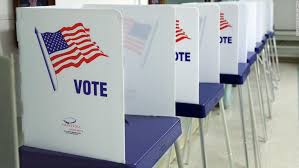
Every time I walk into a voting booth and pull the curtain, my heart races with the responsibility of making the best decisions. Unfortunately in the past decades, I missed a few primary elections, but I’m more careful today. Although I prefer the excitement of voting on Election Day, sometimes I vote early. It’s easy to say, “My one vote doesn’t really count,” but that’s not true. Whether I cast my ballot early or on Election Day, I am aware that my vote does count among all the others in our Jewish community.
A
good voter turnout impresses leaders in government, and that makes a difference
for our community’s needs being met. This is why some people are concerned
about a low voter turnout in the presidential primary this past May. Sandy
Rosenbluth, Chief of Staff for Dalya Attar and member of the Maryland
Democratic State Central Committee, along with her husband, Ronnie Rosenbluth,
a former member of the State Central Committee, are upset that very few people
in our district voted. “Poor voter turnout gives us less influence with elected
officials,” says Mrs. Rosenbluth.
Like
me, some people enjoy the process of voting in person on Election Day, but what
happens if a person can’t get there? According to Mrs. Rosenbluth, if there’s
any chance of not getting to a poll on Election Day, a registered voter should
vote early or mail in a ballot. “I don’t understand the hard part,” she says.
“With so many ways to vote, it’s super easy.”
She
adds that it’s not a secret who the registered voters are. “Any politician can
check who voted and who didn’t.” The politician might then decide which
communities he needs to support. Another reason to vote: If we want an Orthodox
Jewish voice in local government, as b”H,
we’re seeing lately, we have to vote our candidates into office. “When we have
a frum person in office,” states Mrs.
Rosenbluth, “we have someone on our side.” Of course, good leaders are on
the side of everyone in their district. “Delegate Attar looks out for everyone’s
best interests,” says her Chief of Staff. “We never turn anyone away.”
Although
not an elected government official, another person known in the community for
political advocacy and government relations is Rabbi Ariel Sadwin, Executive
Director of Agudah Maryland. Beyond the Agudah’s advocacy work, the office has
been very active over the years in GOTV (Get Out the Vote) efforts, such as
voter registration and education and engaging with the many candidates pursuing
elective office. After observing the success in bolstering voter turnout in
other frum communities, Rabbi Sadwin engaged
the Vaad HaRabbonim of Baltimore this past March to initiate what he calls a
“shul captain system.” As he explains, “The goal would be for rabbonim and shul presidents to appoint
captains throughout their shuls to engage their member households in the lead
up to a primary or general election day, making sure all eligible voters are
registered to vote and then reminding them to go out and vote.”
Although
these efforts began ahead of the May primary election, the proximity to Pesach
made it challenging to have a real impact. The efforts for the November general
election are now underway, and Rabbi Sadwin is hopeful that this will help
generate a maximum voter turnout from our community. He says, “It cannot be
overstated that ‘every vote really counts’!”
An
example of every vote counting is when Johnny Olszewski, the Baltimore County
Executive, won in the 2018 primary as the Democrat candidate by only nine
votes. In one of his speeches following his victory, he said that, as a former
teacher of government, he is happy to show that every vote counts. (“Johnny O”
as he is affectionately called, won his May primary race to become the Democratic
nominee for Maryland’s 2nd congressional seat to be determined
in the general election this November.)
Another
example of every vote counting comes from Mayor Steve Meiner of Miami Beach, an
Orthodox Jew. He won with a majority of votes for mayor. But before this, on
the night of the primary election for Commissioner, he was losing by one vote.
This automatically triggered a recount of the mailed-in ballots. Those ballots that
had been rejected for not correctly filling in the oval or placing a small mark
in another oval were looked at again with the two candidates and their lawyers.
Steve Meiner gained a couple extra votes to win the right to get into the
runoff. In a phone conversation, Mayor Meiner shared that, whenever he ran for
office, the number of voters in the community increased significantly – by around 70%!
That’s what we need to do – get out there and vote so our numbers
at the polls in Baltimore City and County increase significantly. Our Jewish
community is counting on us.






